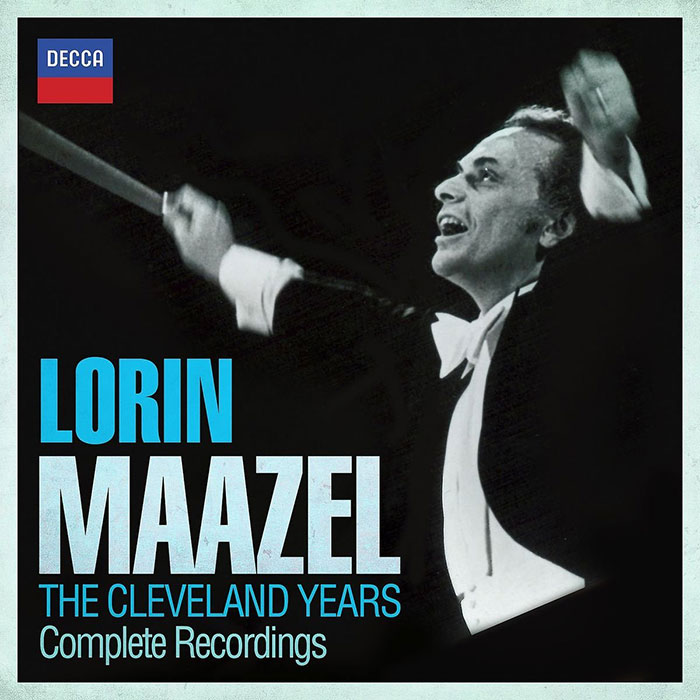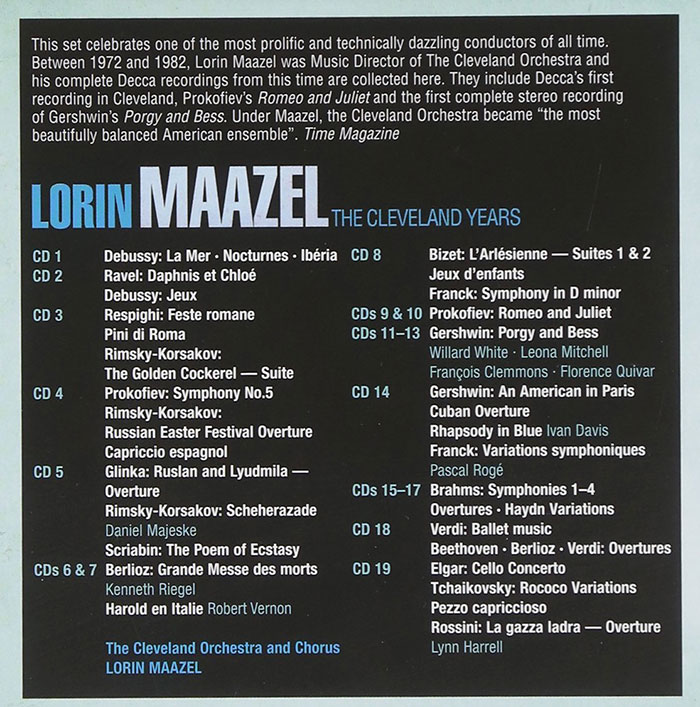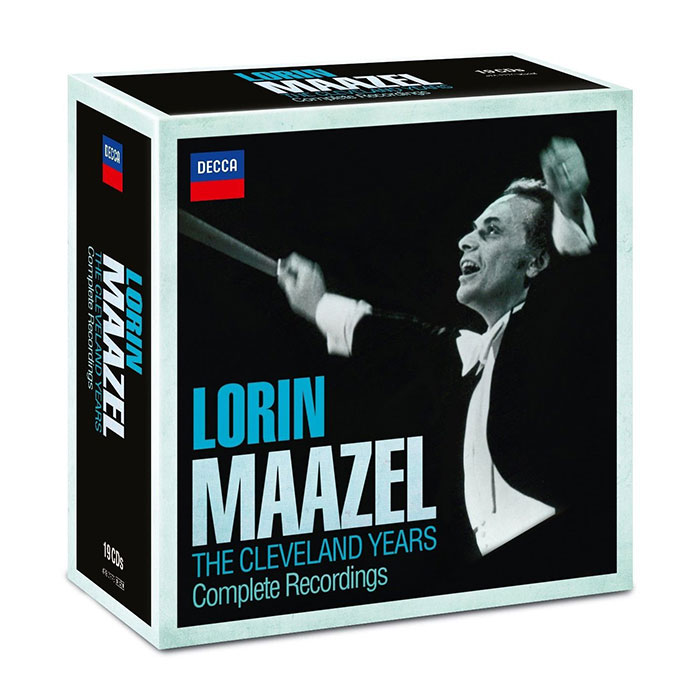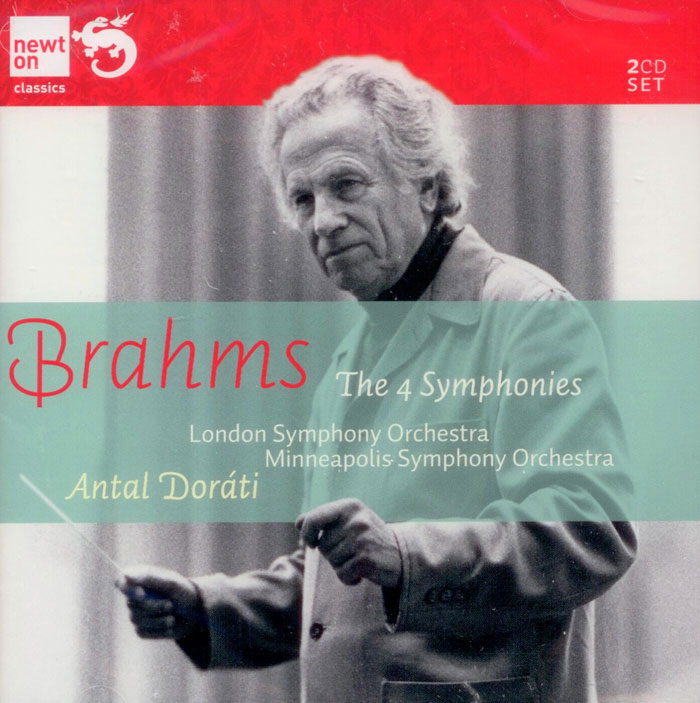Logowanie
Dziś nikt już tak genialnie nie jazzuje!
Bobby Hutcherson, Joe Sample
San Francisco
SHM-CD/SACD - NOWY FORMAT - DŻWIĘK TAK CZYSTY, JAK Z CZASU WIELKIEGO WYBUCHU!
Wayne Shorter, Freddie Hubbard, Herbie Hancock, Ron Carter, Elvin Jones
Speak no evil
UHQCD - dotknij Oryginału - MQA (Master Quality Authenticated)
Chesky! Niezmiennie perfekcyjny
Winylowy niezbędnik
ClearAudio
Double Matrix Professional - Sonic
najbardziej inteligentna i skuteczna pralka do płyt winylowych wszelkiego typu - całkowicie automatyczna
VERDI, GERSHWIN, BRAHMS, BERLIOZ, PROKOFIEV, Lorin Maazel, The Cleveland Orchestra
The Cleveland Years - Complete Recordings

- Lorin Maazel - conductor
- The Cleveland Orchestra - orchestra
- VERDI
- GERSHWIN
- BRAHMS
- BERLIOZ
- PROKOFIEV
It would of course have been too much to ask Decca to simply release the complete Maazel recordings. They already blew that opportunity by issuing a randomly assembled Vienna box. At least we have this complete edition of Maazel’s Cleveland performances. Since he recorded everything for everyone, multiple times, for reasons which defy rational explanation, it’s good to report that on balance he did much of his best work for Decca in Cleveland. Part of the reason stems from smart repertoire choices, and part stems from the superb condition of the ensemble that George Szell left him. Of course Maazel deserves at least some of the credit too, but podium wizard that he was, it still helps to have a great orchestra at your baton tip. So, here’s the deal: CDs 1 & 2: Debussy’s La Mer, Nocturnes, Ibéria and Jeux. Ravel’s complete Daphnis et Chloé. These are all excellent performances, well-played and atmospheric. The Daphnis has always been one of the most underrated modern versions, and the Debussy recordings markedly outclass Maazel’s weird Vienna remakes for RCA. CD 3: Here we have Maazel’s reference version of Respighi’s Feste romane along with his less great Pines of Rome, plus an aptly colorful Rimsky-Korsakov Golden Cockerel Suite. Being the conductor responsible for the reference version of Feste romane is kind of like a singer owning the role of Second Harlot in Handel’s Solomon–it’s an achievement, of sorts, but it looks kind of odd on your resumé. CD 4: More fine Rimsky (Russian Easter Overture and Capriccio espagnol), and an alternately powerful and frustrating Prokofiev Fifth. Here, in a nutshell, is everything annoying about Maazel. At the end of the first movement exposition, Prokofiev marks the woodwind and violins “animato.” Just about everyone else speeds up a bit here, or adopts a basic tempo that permits an “animato” characterization of the melodic line. Not Maazel. “Tempo 1? Prokofiev has marked some bars previously, and “Tempo 1? is what Maazel delivers, even if it goes against the plain musical sense. Compare Maazel to a typical good alternative–Previn and the L.A. Philharmonic on Philips. It’s a classic case of not seeing the forest for the trees. CD 5: A standard Glinka Ruslan and Lyudmila Overture coupled to a very virtuosic Scheherazade and a reference Scriabin Poem of Ecstasy–magnificently played (great trumpet solos), transparent, and not so sweaty as to become intolerable. CDs 6 & 7: Berlioz–a very good Harold in Italy (Maazel always did it well, both here and on his DG remake), coupled to a boring Requiem. The Lacrymosa is particularly droopy. Ignore the booklet timings. The March of the Pilgrims in “Harold” does not take the same time as the first movement. CD 8: These forces could give fine performances of Bizet’s L’Arlésienne Suites and Jeux d’enfants in their collective sleep. Happily, the remain awake here. The Franck D Minor Symphony is also very good, if a little bit stiff in the outer movements compared to, say, Monteux. CDs 9 & 10: Prokofiev’s complete Romeo and Juliet ballet, still the reference recording. CDs 11-14: Gershwin! These razor-sharp recordings include the superb complete Porgy and Bess, and wonderful versions of the Rhapsody in Blue (with Ivan Davis), An American in Paris, and the Cuban Overture. Gershwin has seldom sounded so classy. A perfectly enjoyable Franck Symphonic Variations with Pascal Rogé rounds out the Gershwin orchestral music disc. CDs 15-17: The complete Brahms symphonies, overtures, and Haydn Variations. These are good performances, but they compete (in Cleveland alone) with Szell and Dohnányi, which are reference editions for many. You won’t be disappointed, probably, but it’s hard to get very excited. CD 18: Verdi ballet music and overtures by Beethoven, Berlioz, and Verdi again. What’s not to like? CD 19: Rossini’s Thieving Magpie Overture, Elgar’s Cello Concerto, Tchaikovsky’s Rococo Variations and Pezzo Capriccioso with cellist Lynn Harrell. Great Rossini, but as for the concertos,who cares? Sonics are, for the most part, very good, and there’s much more worth having in this set than not. The problem, of course, is that the best items are very well known and most collectors already will have them. But if you don’t, and you want EVERYTHING that Maazel did in Cleveland for Decca, here it is. Some of these recordings will surprise you. -- David Hurwitz, ClassicsToday.com




































